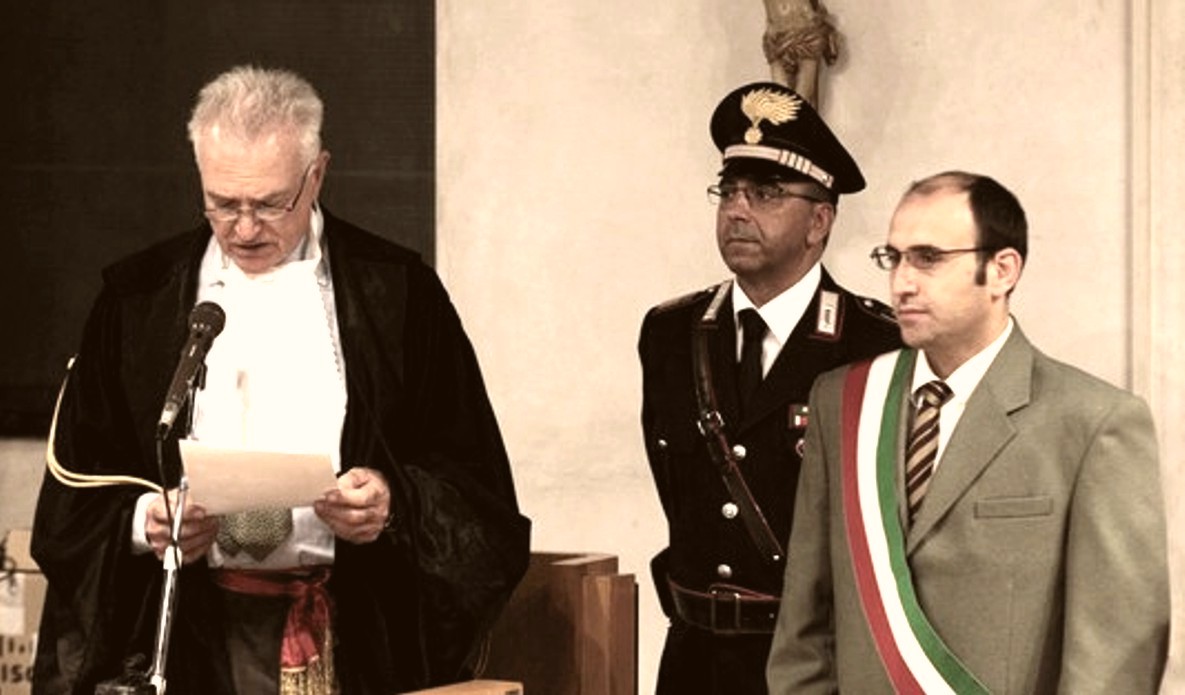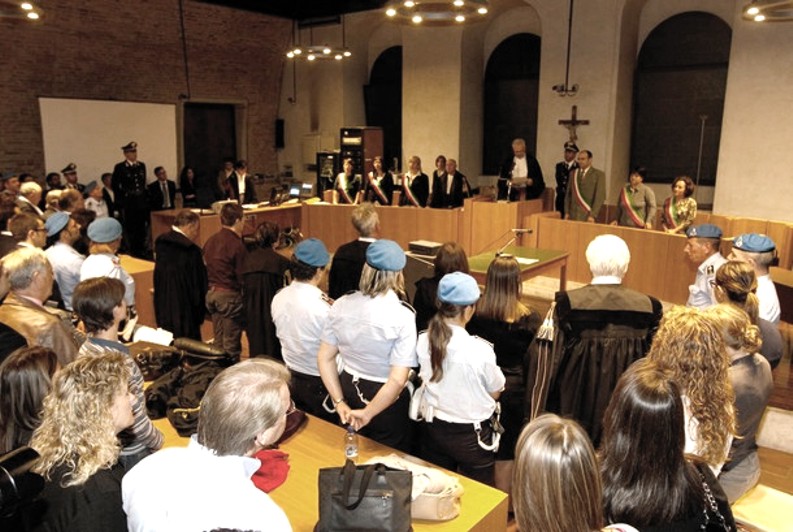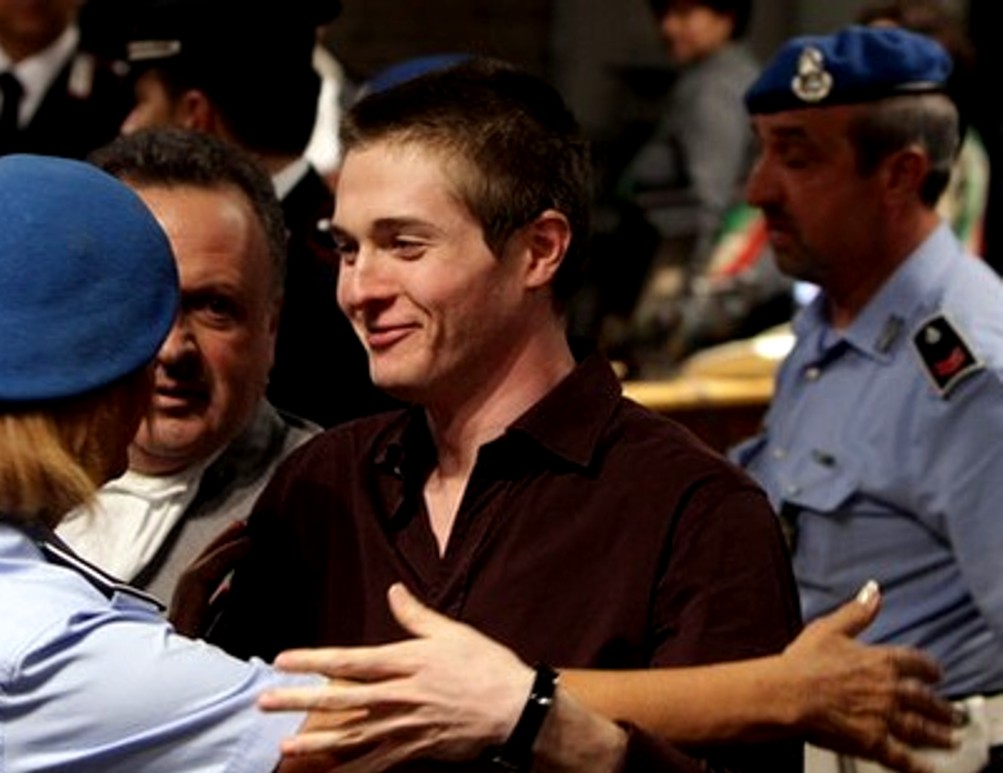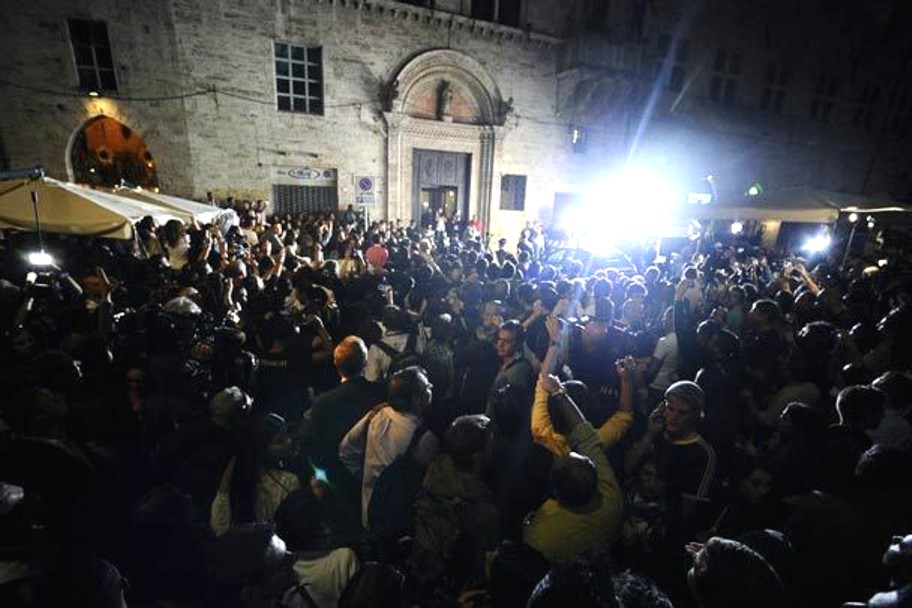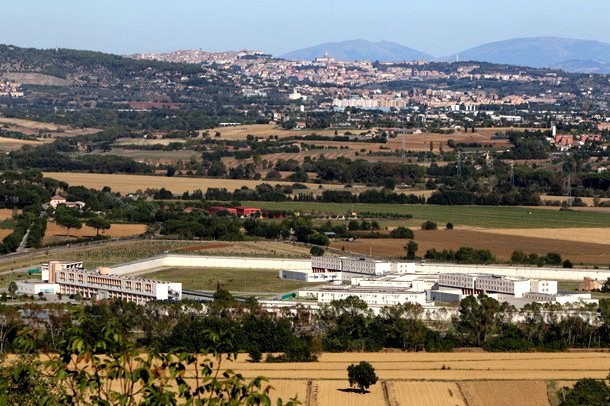
Category: Hellmann 2011+
Monday, February 13, 2012
Italian Report That Prosecution Appeal Against Knox-Sollecito Appeal Verdict Could Be Filed Tomorrow
Posted by Peter Quennell

Italian media are widely reporting that the prosecution appeal will be filed for sure this week with the Supreme Court of Cassation in Rome.
We have previously posted on the pending filing of the appeal documents here and here and here. The well-infomed website Perugia Today now reports that the prosecution appeal may very well be lodged tomorrow, Tuesday.
The report goes on to sardonically remark that, based on media shots like the above, the “supermodel” seems to be losing her charms amid the hard realities that faced her back in Seattle.
The hair in a ponytail is not shining, and the absence of the usual pantsuit indicates that with freedom and the return to the US a few pounds have accumulated on the flanks.
The denim jacket takes away the rest of the charm that this girl had aroused in many in Seattle during the process. Away from the stage lights, the banality of being back daily hits home.
The report goes on to say that the prosecutors and police have never stopped believing in Knox’s guilt, even though Judge Hellman swept many strong indicators under the rug.
Hmmm. Finally Knox and Sollecito really might now want to return and take the stand. Lie detector tests and brain scans might also prove of help.
Tuesday, February 07, 2012
Knox Team to Appeal Conviction And 3-Year Sentence For Framing Patrick Lumumba
Posted by Peter Quennell

[Above: the Supreme Court of Cassation]
Appeals against Judge Hellman’s rulings must be lodged in Rome by 18 February.
Now Reuters is reporting a Knox-team appeal apparently announced by David Marriott. The Knox team probably had little choice but to lodge this seeming long-shot of an appeal.
Judge Hellman’s ruling left her “half pregnant” facing a hard-line and unbendable Supreme Court and it left her mom and dad more vulnerable in their own trial for calunnia for claiming in a UK interview that Knox only “confessed” in fingering Patrick because of duress.
Explanation of calunnia
The charge of calunnia (art. 368) has been commonly translated as “slander” in the English/US media. This translation is incorrect, however, as calunnia is a crime with no direct equivalent in the respective legal systems.
The equivalent of “criminal slander” is diffamazione, which is an attack on someone”Ÿs reputation. Calunnia is the crime of making false criminal accusations against someone whom the accuser knows to be innocent, or to simulate/fabricate false evidence, independently of the credibility/admissibility of the accusation or evidence.
The charges of calunnia and diffamazione are subject to very different jurisprudence. Diffamazione is public and explicit, and is a more minor offence, usually resulting in a fine and only prosecuted if the victim files a complaint, while calunnia can be secret or known only to the authorities. It may consist only of the simulation of clues, and is automatically prosecuted by the judiciary.
The crimes of calunnia and diffamazione are located in different sections of the criminal code: while diffamazione is in the chapter entitled “crimes against honour” in the section of the Code protecting personal liberties, calunnia is discussed in the chapter entitled “crimes against the administration of justice”, in a section that protects public powers.
Judge Hellman essentially contradicted Cassation’s ruling on Guede which agreed strongly that Guede and two others did it (Judge Hellman of course went for the very tenuous lone wolf approach which Judge Micheli and Judge Massei both shot down in some detail) which had many lawyers in Italy doing double-takes.
Knox in fact fingered Patrick when she was merely a witness who had not even been invited to Perugia police headquarters for the evening and who had volunteered for the questioning.
The interrogators have all claimed she was under no duress except the duress of hearing that Sollecito in the next interrogation room had just called her a liar and destroyed the latest of her various alibis.
Then she had several weeks (as did her mom) to move to spring a devastated Patrick from an adjacent wing in Capanne prison, but of course she didn’t.
Her lawyers never lodged a complaint against the claimed duress and on the witness stand at trial in mid-2010 the prosecutors actually got her to admit that she was treated well.
Key at this stage may be that Knox cannot use her natural advantages of being young and rather dopey and of being able to speak up in court at any time, not under oath or cross-examination, which she used twice in front of Judge Hellman (with lusty sobs and tears for herself and no caring for Meredith).
Cassation works like Supreme Courts elsewhere in Europe and the United States They receive the written appeals and then months or even years later hold very brief hearings, and then almost immediately issue a ruling. It looks to us like the case almost certainly gets bounced back to Perugia - and a new judge - for re-working.
Judge Hellman may have found Patrick’s highly aggressive lawyer impossible to overrule, and he would have been wildly unpopular in Italy to leave Patrick without even his small settlement. If Patrick’s lawyer does not somehow react to this appeal it will be a surprise. He may have the opportunity for rebuttal.
This case has thrown up a lot of possibilities for shortening the Italian process in murder cases and leveling the playing field in favor of victims and families. We’ll round up and post ideas for such reforms already being pushed in Italy by reformers such as Barbara Benedettelli.
Reforms might include no right to defendant statements in court without the possibility of cross-examination, the limiting of judges’ scopes in first appeals, and no jury being required for those appeals.
But everybody sure appreciates those judges’ and juries’ written statements. A precedent the whole world could use.
Friday, December 16, 2011
Our Translation Of Today’s Corriere Newspaper Report On The Hellmann Motivation Document
Posted by ziaK
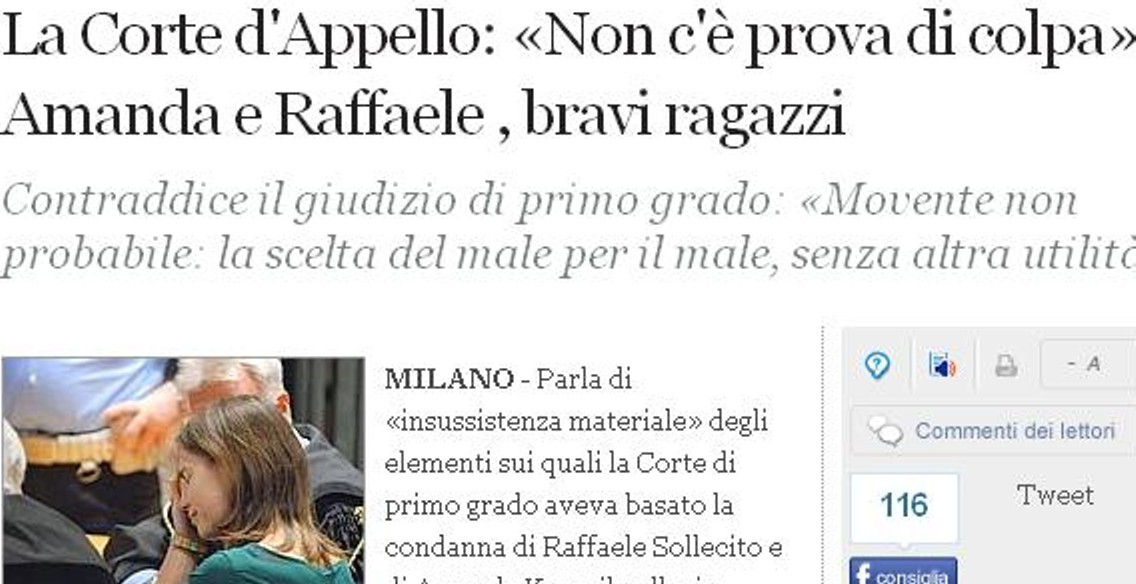
Click image above for the original. This is today’s straight reporting. In-depth commentary should start appearing soon.
The appeal court: “There is no proof of offence” : Amanda and Raffaele are good kids
The report contradicts the first instance judgment: “The motive - of an unplanned choice of evil without purpose by two good youngsters, who were well-disposed towards others - is improbable”
MILAN - The board of appeal judges, which acquitted the two young folk of the charge of having murdered Meredith Kercher, talks of the “essential baselessness” of the elements upon which the Court of the first instance based their conviction of Raffaele Sollecito and of Amanda Knox.“There is no proof of guilt” with regard to Amanda and Raffaele, writes the judges of the Appeal court of Perugia, in the “reasoning” report on the second-grade acquittal ruling, which was published on Thursday. This baselessness, according to the report, “takes precedence over even the equivocality of those same elements”.
“BUILDING BLOCKS” OF THE CONSTRUCTION - In the 144 pages which must be lodged before 3 January, the judges who wrote the report claim that “those same building blocks” which led the first-instance judges to convict Raffaele Sollecito and Amanda Knox “had failed”. “The Assizes Court of the first instance felt the need to seize upon a motive which, however, while it was not corroborrated by any element of proof, was in itself entirely improbable”, says the report, which demolishes, brick by brick, the structure upon which the judges of the first instance based their verdict of guilt.
GOOD KIDS - “The unplanned choice, by two good young folk, who were well-disposed towards others, of evil for evil’s sake, without any other purpose, is even more incomprehensible because it was aimed at upholding the criminal acts of another youth, Rudy Guede, with whom they had no relations, and is unlike their own personal histories, character and human condition.”
RUDY GUEDE - The judges set out these considerations, reflecting briefly on Rudy Guede’s definitive sentence to 16 years of incarceration for his participation in Meredith Kercher’s murder. In the reasoning report, they explain that the hypothesis of the participation of several people in carrying out the crime had been set out in the Ivorian’s appeal-court conviction [which had] “basically upheld all the arguments put forward by the prosecutor”.
According to the judges who acquitted Sollecito and Knox, however, “an analysis of every single element on which the hypothesis of joint contribution [to carrying out the crime] leads one, at the least, to doubt the necessary participation of several people in perpetrating the crimes in question”. The Assizes court of appeal therefore stated that they could “concur with” the appeal court conviction with regard to Guede’s responsibility, without “assuming that this conviction has any probatory relevance” as far as determining the responsibility of Sollecito and Knox is concerned.
“The only evidentiary elements which remain unopposed (the crime of “calunnia’ towards Patrick Lumumba) but without the aggravating circumstance, the incompletely demonstrated truth of the alibi, and the dubious reliability of the witness (Quintavalle), when taken as a whole, do not even allow us to hold that the guilt of Amanda Knox and Raffaele Sollecito has in any way been clearly demonstrated”.
AMANDA UNDER STRESS - “Over and above the formal aspect”, the judges write, “the context in which those declarations were made was clearly characterized by psychological conditions which had become, for Amanda Knox, a truly unbearable burden. In that context, it is understandable that Knox, yielding to the pressure and to fatigue, had hoped to put an end to the situation, by giving to those who were interrogating her what they, at heart, wanted to hear: a name, an assassin.
By giving “the news” of that name to those who were interrogating her so harshly, Amanda Knox hoped, no doubt, to put an end to that pressure, by then - after many hours - a real torture, while adding details and building a brief story around that name was surely not particularly difficult, since many of the details and many conjectures had already appeared the previous day in many newspapers, and were in any case doing the rounds of the town, given the small size of Perugia”.
According to the judges, furthermore, for Amanda “it would have been easier to name the real author of the crime” because “basically, she lived in that house, and to have been there at the time the crime was committed, in her own room, perhaps entertaining [herself with] Raffaele Sollecto, would have been a completely normal circumstance, to the extent that it would certainly not entail responsibility for a crime committed in the room beside [hers]”.
WHO MUST JUDGE - “Having excluded the existence of the proof of guilt which the two current defendants are charged with”, the judges write, “it is not up to this Court to suggest how the affair [the crime] might really have been carried out. Nor whether the author of the crime was one or more than one person, nor whether or to what extent other investigative hypotheses might have been neglected.”
Breaking News Thursday: Judge Hellmann’s Sentencing Released In Italian; Responses From Italy Follow
Posted by Peter Quennell
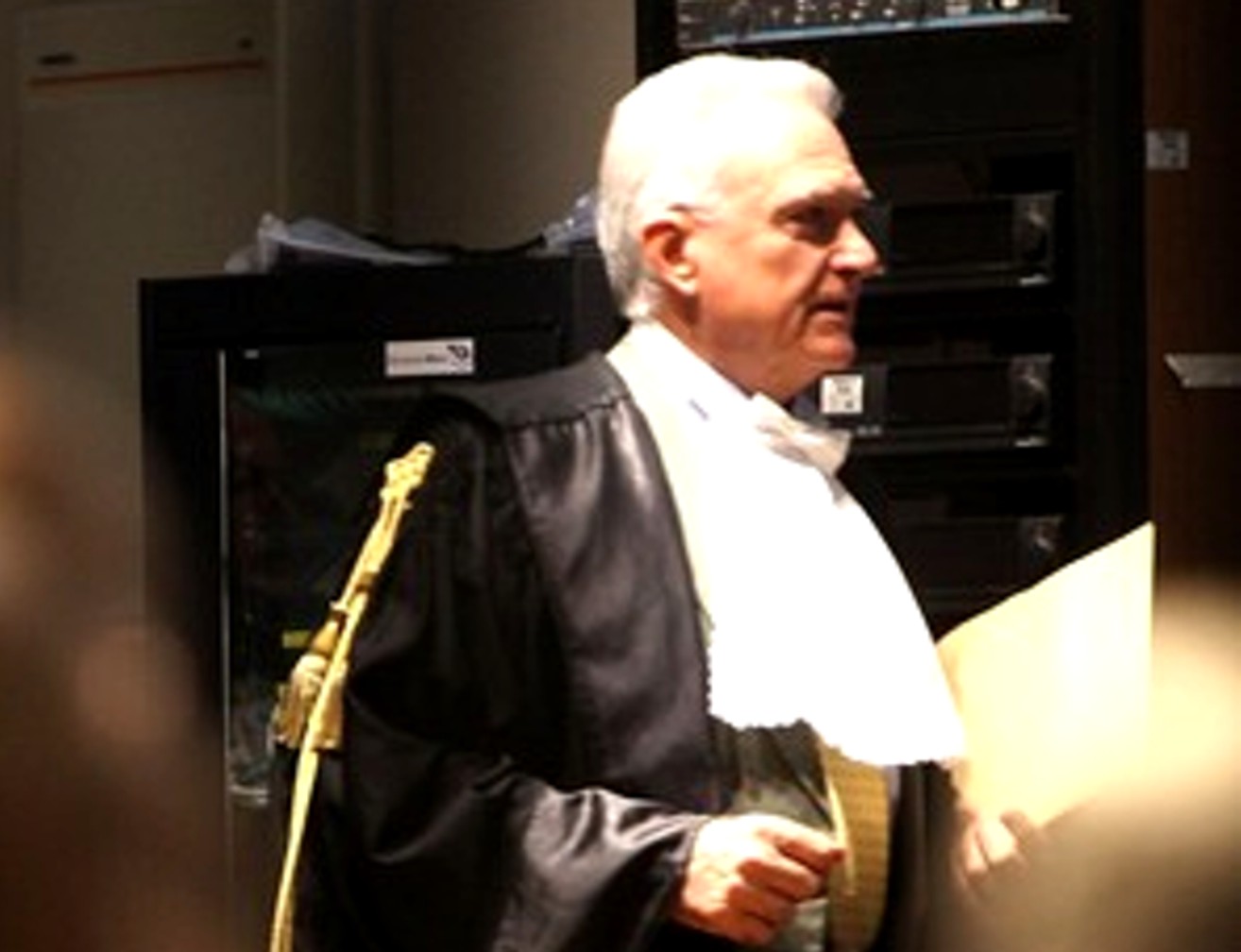
Quick summary of main points of the 150 page report by our Italian poster ncountryside below.
We will have a roundup post on the reporting and takes of the Italian media on Friday and a full translation courtesy of the fluent Italian speakers on PMF in due course.
At first glance our lawyers in three countries are not at all impressed. Any seamless legitimizing is seemingly not obvious to them.
Page 8
Lumumba was arrested following “spontaneous” Knox’s statements.Please note: Court’s quote.Page 11
The previous report is long even (italian: “ben”) 425 pages.Page 12
Quintavalle: testimony, however, after one yearPage 27
Guede and sentence of Supreme Court. The sentence is not binding for the Appeal Court mainly because: defendants would be judged on the basis of evidence obtained in their absence during Guede’s trial; Guede’s trial was fast Track (“abbreviato”).Page 28
Bra clasp, knife, wounds, break-in: examining separately all these facts is strengthened the hypothesis of the presence of an only one person in the house.Page 30
In page 30 cartwheels are recognized as “gymnastic maneuvers” ( italian: “manovre ginniche”).Page 30-35
Calunnia. AK accused Lumumba because exhausted by obsessive interrogations without lawyer. She was well aware of accusing an innocent person, so she is guilty but without aggravating circumstances. Anyway her guilt cannot be used as evidence to the murder.Page 40
Guede surprisingly has never been questioned .... follows the description of the well known hearings ... conclusion: Guede is unreliable also for this trial, in particular during the hearing of 27 June and also his letter. Instead the chat from Germany with his friend Benedetti is considered reliable.Page 42
Aviello, Alessi, Castelluccio, De Cesare, Trincan. Called by defense are considered unreliable but the prosecution can not exploit them as witnesses against the defendants.Page 44 and following.
Curatolo. He is a tramp, now held in prison, with a decline of his mental faculties. Unreliable.Pages 51-55
Quintavalle. One year later.Pages 56-58
Capezzali. Unreliable
Monacchia. Not clear.
Deamis.Unreliable.Pages 58-61
Phone calls. For the Court, Bongiorno’s considerations are valid while Massei is wrong, so the time of death is fixed not later than 22,30Page 64
Murder weapon.The arguments of defense consultants seem more convincing than the prosecution’s.Page 87
The clue represented by presence of Meredith’s dna on the knife cannot be considered valid/existingPage 92
Bra clasp. Contaminated before gatheringPage 100
Footprint on the bathmat. Probably belongs to Guede... Mixed blood ...
Pages 114-123
Staged break-in. Real and not staged.Pages 123-130
Alibi. Erroneous conclusions drawn by the Court because based on erroneous scientific expertise .Page 129
The shower. Not implausiblePage 131
Phone call to Meredith at 12.07. Nothing of suspect.Page 137
Remain; 1) calunnia 2) non completely proved alibi.
Wednesday, October 05, 2011
Nancy Grace’s “Miscarriage Of Justice” Observation Goes Viral, Google Says It’s On 38,000 Sites
Posted by Peter Quennell

Amanda Knox will be lucky if CNN’s popular legal commentator Nancy Grace doesn’t get on her case the way she still is on Casey Anthony’s.
Nancy Grace says there is NO innnocent explanation for Knox’s second written confession placing her at the house (with Patrick Lumumba) and including observations that only someone who really was there could have known.
We have noticed that time and again commentators have come out batting for Knox, read the evidence, and then gone quiet. Nancy Grace’s CNN colleague Jane Velex-Mitchell had swallowed the Kool Aid at one point, but now she is ambivalent and careful.
Here is Huffington Post Media’s version of what Nancy Grace said last night.
Nancy Grace issued a typically blunt verdict on Amanda Knox during a Monday interview.
The outspoken HLN host and fierce ‘Dancing with the Stars’ competitor declared her true feelings about Knox when she spoke to Access Hollywood following her waltz performance Monday night.
“I was very disturbed, because I think it is a huge miscarriage of justice,” Grace said. “I believe that while Amanda Knox did not wield the knife herself, I think that she was there, with her boyfriend, and that he did the deed, and that she egged him on. That’s what I think happened.”
In Knox’s final plea, she told an Italian appeals court that she was not present the evening her British roommate Meredith Kercher was sexually assaulted and brutally murdered in their shared apartment. Grace said she did not think Knox is telling the truth. “I believe her original statement to the police - that she was there in the home when her roommate was murdered was true,” Grace told Access Hollywood.
Social networks like Twitter and Facebook exploded with celebratory messages on Monday as the judge proclaimed Knox’s innocence, allowing the study abroad student to finally return home to Seattle, Washington after four years in an Italian prison.
Grace was not one of those supporters, saying that while she would love to believe Knox innocent, “I just happen to know the facts.” Grace was even harsher when asked if her show would compete with other networks to get the first Knox interview.
“I’m not trying to get Amanda Knox’s first interview because”¦ my show does not pay for interviews…Second, I don’t think she’s going to tell the truth anyway, so what’s the point?” Grace responded.
THAT will get the noses of thousands of new followers firmly into the REAL evidence. Not all that made-up stuff. Other legal commentators may follow Nancy Grace’s lead, because she is the real pace-setter and power broker in that community.
The equally popular Fox News political and legal commentator Bill O’Reilly discussed the verdict on Monday night with Judge Andrew Napolitano, another prominent commentator. This is from the the summary on Bill O’Reilly’s website.
]Bill O’Reilly] concurred that Amanda Knox likely knows what happened on the night British student Meredith Kercher was murdered; therefore, we shouldn’t really be happy with this outcome since a terrible crime is unsolved.
Pity that Judge Napolitano claimed that Amanda Knox was interrogated as a suspect for 56 hours without an attorney. That did NOT happen. She had an attorney present at all times. Someone please correct him. .
Understanding Yesterday’s Knox/Sollecito Verdict
Posted by Maundy Gregory
For those who have been reading my blog Maundy Gregory it will not come as a surprise when I say I am less then wholly satisfied with yesterday’s acquittal of Amanda Knox and Raffaele Sollecito.
I’m very much with the unruly mob shouting “shame!” outside the courthouse this evening. In spirit, you understand.
I don’t even believe this is a case where a court has erred with two left feet on the wrong side of the fine line between technical and reasonable doubt. I’ll not go into the detail of the evidence, since, over the next few days, that will undoubtedly be done thousands of times with greater inaccuracy than I could ever achieve. But perhaps it suffices to give the view that it is such that no acquittal could have been possible under normal circumstances.
It won’t be possible to know how the decision of the court was reached until it publishes its detailed motivation report. But I find it hard to imagine how it will make sense. The disheartening expectation I have, which I think others will share, it that it will offer the reasoning of a court that has crumpled under the pressure of a public relations campaign. A humiliating day for Italy.
And, of course, a heartbreaking tragedy if you are able to spare a thought for the Kercher family. Tomorrow, one of their daughter’s murderers will fly home to ticker-tape and a small fortune. Another, like the drummer in successful rock band, will take a smaller share of the royalties, but the proceeds, taking into account possible government compensation, may still be enough so that he is at liberty to choose whether or not he ever wants to work in his life or not. Merdith Kercher’s death seems almost reduced to the level of a smart career move.
Yesterday’s verdict will undoubtedly, however, be appealed. That’s more than a speculative exercise, since it does happen than people are acquitted at first appeal and then found guilty by Italy’s supreme court. But the focus of the second appeal will be much narrower, restricted only to questions of law and logic. Although that is construed fairly widely in the Italian system, what it means is that the decision of the appeal court can’t be corrected simply because it is wrong.
It will have to be shown to be legally unsound before any evidence can be re-examined. Until the motivation report from the appeal is published, it is impossible to say what the chances of the prosecutors succeeding in a further appeal might be.
The case, because it has had such a high profile, may have ramifications in Italy for two reasons.
Firstly, even though the reasons for the decision will not officially be known for a few weeks, it can be assumed that the court has rejected entirely the forensic evidence provided by the police. That’s not a small matter. As in most European countries, forensic testing in Italy is centralised, so an implication of the verdict may be that the entire forensic science set-up in the country is simply not fit for purpose or, at least, it wasn’t at the time of the investigation.
A modern forensic science service ought to be able to handle DNA evidence that, as in this case, comes from a very small sample or from an item that had lain in situ for some weeks without difficulty. The Italian police would undoubtedly claim that their forensic teams are as capable as any in the world. I’m not in a position to deny that. But, from a practical point-of-view, if the whole of the scientific aspect of a prosecution is capable of simply crumbling in court, it must be important to try to understand why that happened.
Secondly, reform of the judicial system in Italy is a very live issue, in no small part because Silvio Berlusconi stands accused of various crimes and so he has made judicial reform a priority. I think it is unlikely that Italian public opinion will be behind yestrerday’s verdict and it will be seen by many as an example of how Italian justice is far too lenient with defendants.
Personally, I think Italy should take caution before making too reactionary an interpretation of the Knox/Sollecito case. It may be fair to point out that Italian appeals can tend to be slanted so that the focus for live examination is selected aspects of the defence case, so that much of the prosecution case takes a back seat. And there may be some room for quibbling about certain evidentiary rules applied in the case (the exclusion from evidence of Knox’s false allegations against Patrick Lumumba, for example).
But the decision yesterday can’t just be about a systematic problem. The automaticity of appeals in Italy may indeed favour defendants. But, surely, a guilty person ought to remain guilty regardless of how may re-trials are granted.
If, like me, you’re disheartened by yesterday’s verdict, then I don’t really have much to offer by way of consolation, except the observation that justice is not always done and that’s something we have to live with. And at least you know, next time you kill someone, to think about who is going to do your PR before you think about who your lawyer is going to be.
Tuesday, October 04, 2011
Media Reaction Commences: What Is It About Amanda Knox…
Posted by Peter Quennell

Media can be a fickle friend. Big bucks may now be dictating a U-turn. One early indicator?
We should be happy for her, the innocent victim of this terrible miscarriage of justice.
Yet there is something disquieting about Amanda Knox, something that slightly chills the blood. Those piercing blue eyes, as cold as the steel of the knife that slit Meredith Kercher’s throat, have hardly flinched during her court appearances.
Not since Lindy-the dingo-did-it-Chamberlain was cleared of murdering her baby has a woman so divided public opinion.
Amanda’s prison diaries reveal an astonishing calmness and self-belief. While most 20-year-old girls falsely accused of a vile sex murder would be in pieces, she was planning her 21st birthday party, right down to the guest list.
There is hardly a mention of the brutal murder of her friend in the bedroom next to her. It’s all about Amanda.
Even The Independent’s Peter Popham is pouring cold water on the parade. Helping to find “the real killers” may be a way to help stem this tide.
Monday, October 03, 2011
Knox And Sollecito Declared Not Guilty But With Angry Booing Outside The Courtroom
Posted by Peter Quennell
Van Watch: Around 8:00 PM Perugia Time And The Vans Are Reported Still At Capanne
Posted by Peter Quennell
The BBC and other news services are keeping a close eye on the gates of Capanne Prison.
When the vans carrying Sollecito and Knox exit and head back for Perugia (at the top of the massif in the shot below) the judges and lay judges will have something to announce.
Added: the two blue vans are on their way back to Perugia from Capanne and they should be arriving at the court about now. The defendants may enter at the level of the street tunnel that runs right under the court. If so then they walk up or catch an elevator.
When they were found guilty in 2009 they exited that same way. The court is one level below street level but if the windows had clear glass in them the views to the east would be terrific. The court is NOT underground as some of the media commentators have claimed.
Twentieth Appeal Session: Translated Transcript Of Amanda Knox’s Final Plea To The Court
Posted by Peter Quennell
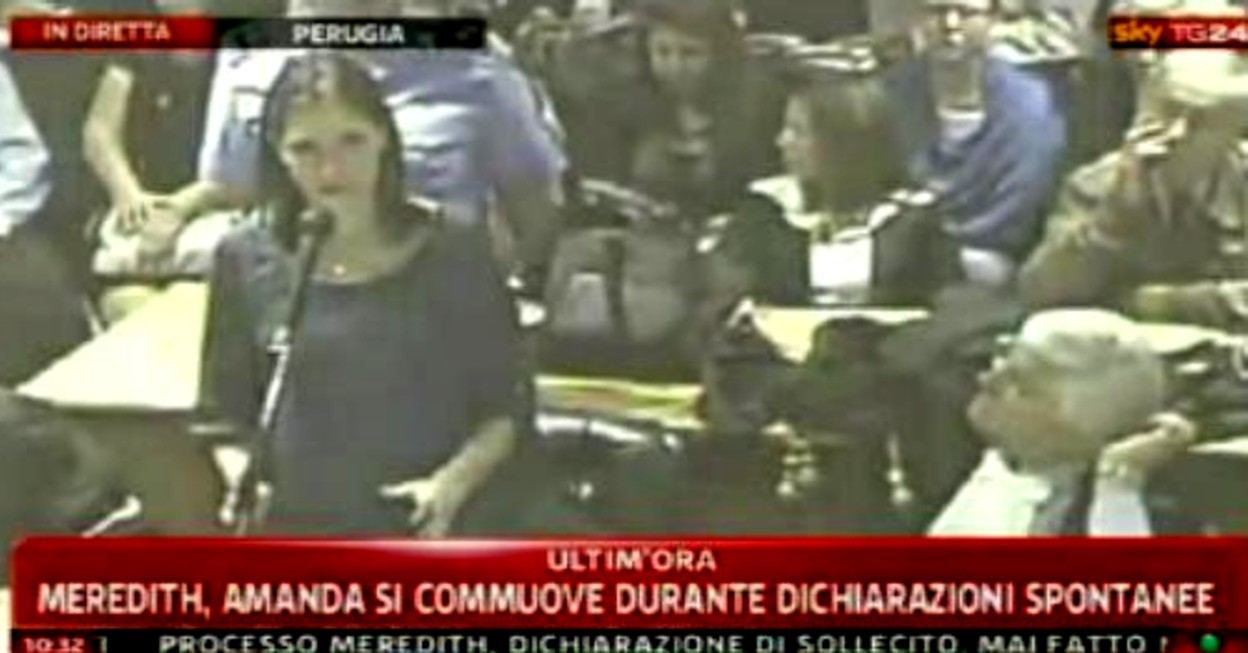
The image above and Knox’s remarks below are from one of the live broadcasts of the pressroom feed.
Members of the court. Many times people have said I am some other person, people don’t understand whom I am. The only thing different from four years ago is what I have suffered. I lost a friend, a girlfriend, in the most brutal way in the most unexplained manner.
My trust in the police authorities has been betrayed. I have had to dealt with unfair and unfounded charges. I have paid with my life for things that I did not commit.
Four years ago I did not know what tragedy was. I have never faced so much anger before. I didn’t know how to interpret it. How did we react when we found out Meredith had been killed? I did not believe it. How was it possible?
Her bedroom was next to mine. She was killed in our home. If I had been there that night I would have died. The only difference is, I was not there. I trusted the police’s sense of duty and trust. I trusted them completely. I was betrayed on the night of November 5. I was manipulated.
I am not who they say I am. I am not violent. I don’t have a lack of respect for life. And I did not kill. I did not rape. I did not steal. I wasn’t there at the crime scene.
I had good relationships with everyone who lived in my flat. We all had good relationships. We helped each other. I shared my life, particularly with Meredith. We were friends. She was worried about me. She was very kind to me.
I have never run away from the truth. I insist after four desperate years, that our innocence is true and needs to be recognized. I want to go back home. I want to go back to my life. I don’t want my life and my future taken away from me for something that I didn’t do.
I am innocent. We do not deserve this. We never did anything to deserve this. I have the utmost respect to this court and the care that it has shown. Thank you.

